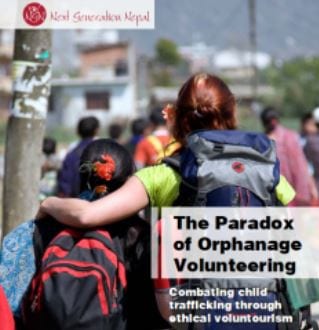
The Paradox of Orphanage Volunteering: Combating child trafficking through ethical voluntourism
The significant rise in children being separated from their parents to live in orphanages is a relatively new phenomenon in Nepal with its roots in the 10-year civil war, which ended in 2006. During the conflict, traffickers portrayed themselves as boarding school representatives and made promises to parents about modern schools and safe living conditions in Kathmandu, which their children could benefit from. However, instead of being taken to educational institutions, these children were taken to under-resourced children’s homes where they were at risk of exploitation and inter-country adoption as ‘paper orphans’(children with living parents whose legal papers have been falsified to portray them as orphans). ‘Orphanage voluntourism’ is a term used to define a spectrum of activities related to the support of orphanages and children’s homes by individuals who are primarily, or were initially, tourists on vacation. Next Generation Nepal (NGN) argues that there is a direct link between orphanage trafficking, institutionalization and the phenomenon of orphanage voluntourism. That’s what this report is all about. It is about explaining to these good-hearted volunteers, donor agencies, NGOs, embassies and the Government of Nepal the things that we are witnessing in Nepal today with orphanage and child trafficking and its links to voluntourism. Moreover, it offers advice and recommendations for everyone who has a part to play in encouraging ‘ethical voluntourism.’
Read full report here.
